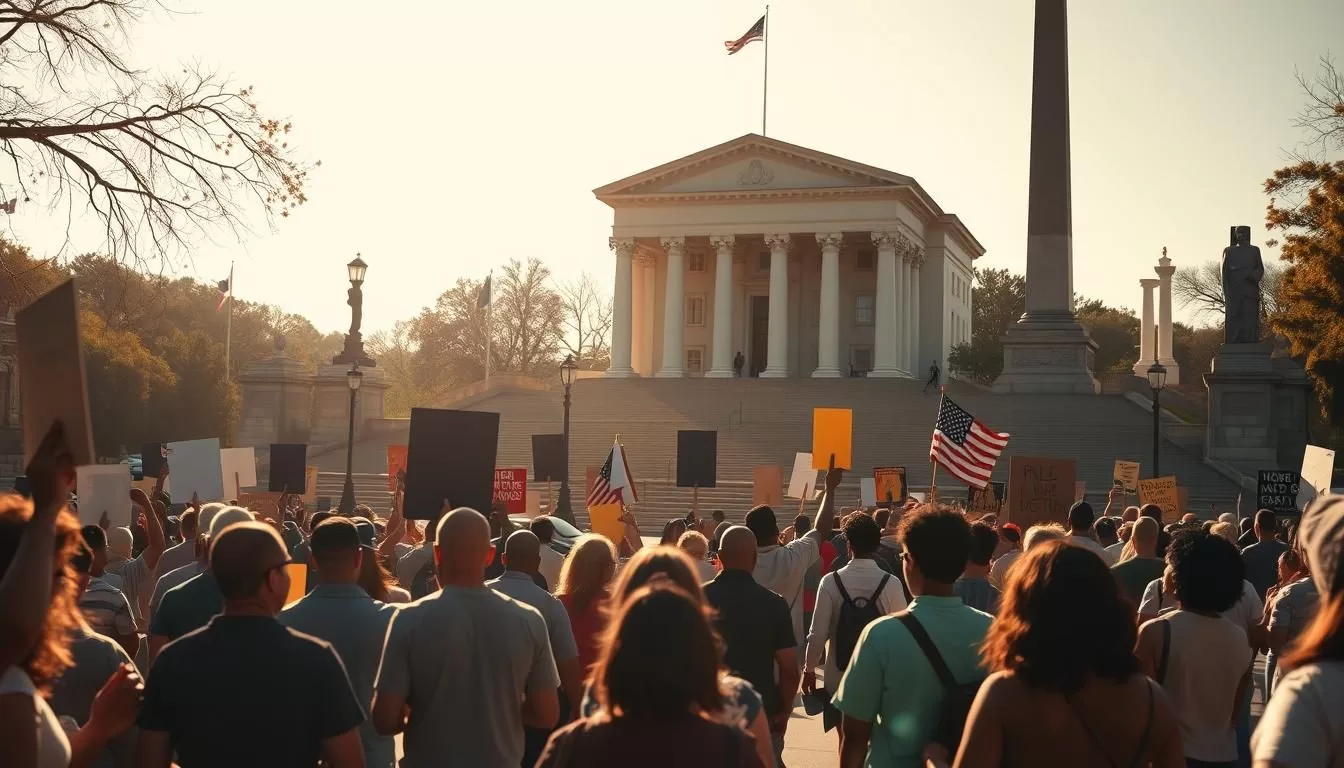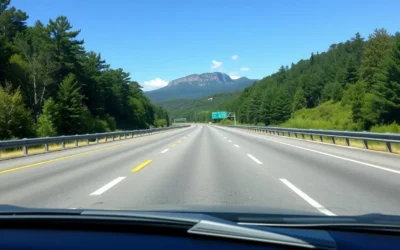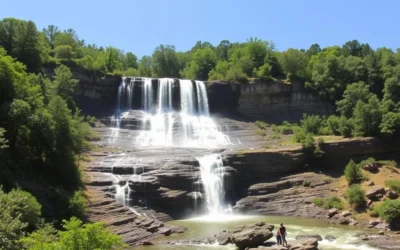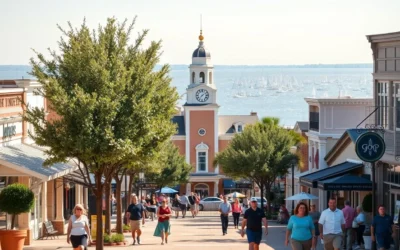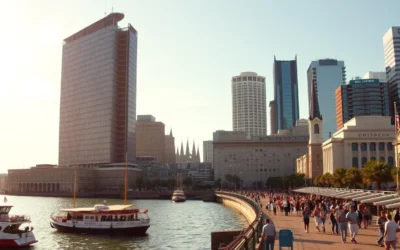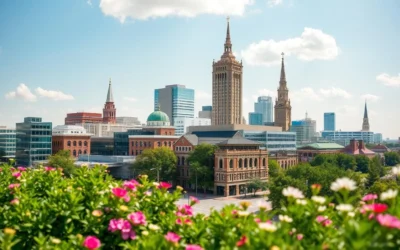✓ Accommodations✓ Flights✓ Rental Cars
As you plan your trip to Selma, Alabama, you’ll discover a city rich in history and civil rights heritage. This charming city offers a unique blend of attractions that highlight its pivotal role in American history and its vibrant present.
You’ll experience a memorable travel experience as you explore the city’s downtown area, take in the scenic landscapes, and delve into its significant history. Selma is more than just a quick stop on your trip; it deserves a deeper exploration to uncover its top attractions and experiences.
By visiting Selma, you’re not just sightseeing; you’re embarking on a transformative journey through American history and civil rights heritage, all while enjoying the city’s renowned Southern hospitality and charm.
Discovering Selma’s Historical Significance
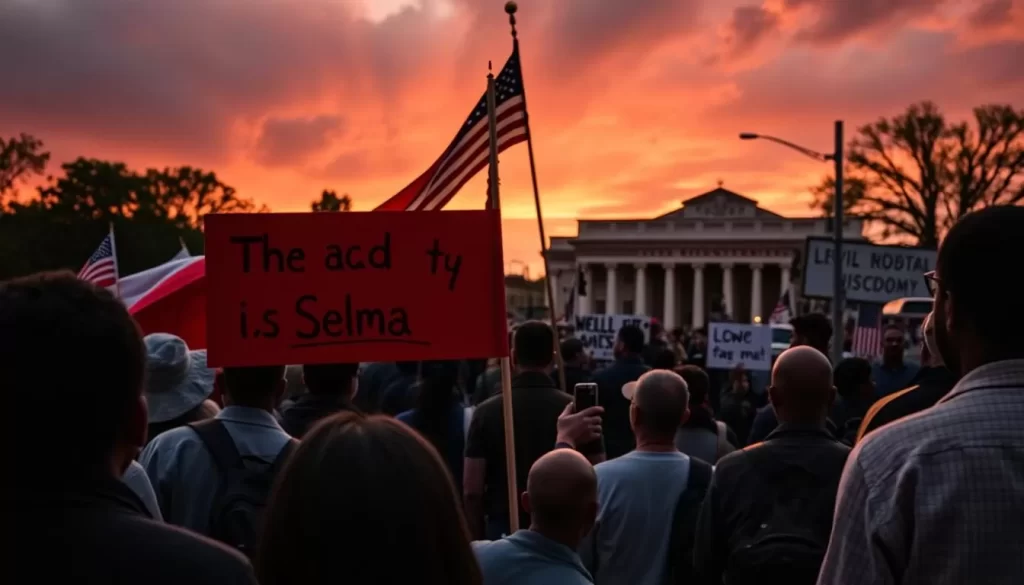
As you explore Selma, Alabama, you’ll uncover the city’s profound impact on the civil rights movement. Selma was more than just a backdrop for significant events; it was a catalyst for change, driven by local leaders and pivotal moments that shaped the nation’s history.
The Civil Rights Movement in Selma
Selma’s transformation into the epicenter of the civil rights movement in the 1960s was not sudden. Decades earlier, in the 1930s and 40s, a group known as the “Courageous 8” pioneered efforts to secure Black voting rights, laying the groundwork for the significant events that would follow. Understanding this history is crucial to grasping the significance of Selma’s role in the broader rights movement.
Bloody Sunday and the Voting Rights Act
The events leading up to Bloody Sunday on March 7, 1965, were marked by escalating tensions and resistance. The brutal attack on peaceful protesters on the Edmund Pettus Bridge shocked the nation, catalyzing support for the Voting Rights Act of 1965. Martin Luther King Jr. played a pivotal role in the Selma movement, employing strategies of peaceful protest that continue to inspire movements for justice today.
Edmund Pettus Bridge: Walking in the Footsteps of History
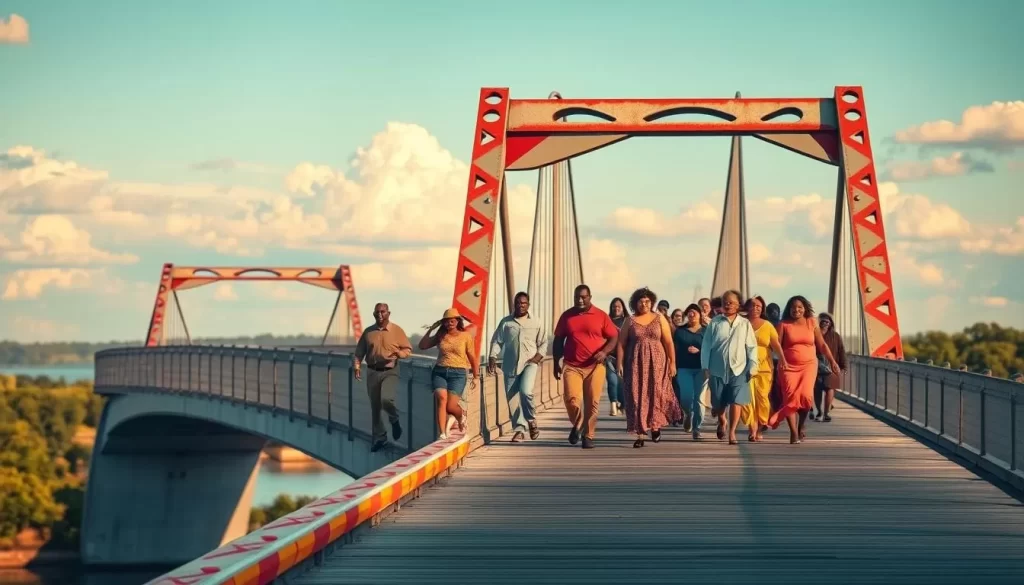
Walking across the Edmund Pettus Bridge is a powerful experience, offering a tangible connection to the events that shaped the nation’s approach to civil rights. This historic site was the location of the “Bloody Sunday” march in 1965, a pivotal event that led to the passage of the Voting Rights Act.
Historical Significance of the Bridge
The Edmund Pettus Bridge is an iconic landmark and a symbol of the Civil Rights Movement. Named after Edmund Pettus, a former Confederate general and Ku Klux Klan leader, the bridge’s history is complex, reflecting the irony of its namesake’s legacy being tied to a landmark of civil rights progress.
Tips for Walking Across the Bridge
To make your visit meaningful, consider the best times to visit and photography recommendations. Walking across the bridge allows you to reflect on its significance and follow the Selma to Montgomery National Historic Trail to learn more about the march and its impact on American history. Pausing at the bridge’s apex can be a poignant moment to reflect on the courage of those who faced violence and intimidation.
National Voting Rights Museum and Institute
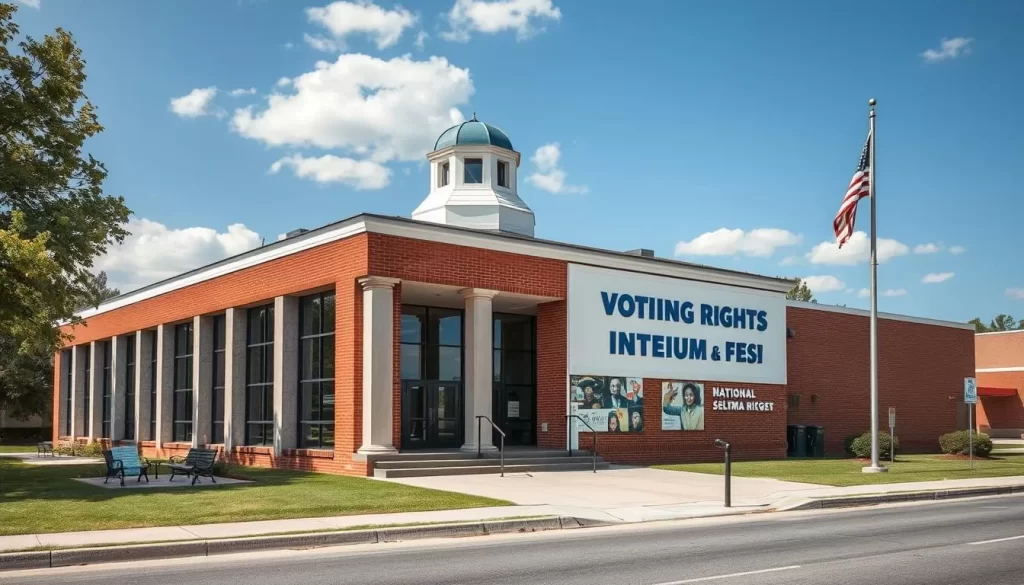
In the heart of Selma, the National Voting Rights Museum and Institute stands as a testament to the courageous individuals who fought for equality and justice. Located near the Edmund Pettus Bridge, this museum offers an in-depth look at the struggle for voting rights in the United States.
Exhibits and Collections
The museum features a comprehensive collection of artifacts, photographs, and personal stories from those who were part of the Civil Rights Movement. You can explore exhibits that include pictures taken during the protests and detailed accounts of the history of race relations in Alabama. One of the most compelling aspects is the “Footprints to Freedom” exhibit, featuring the footprints of actual marchers who participated in Bloody Sunday.
The museum also houses police documentation of the marches, including photographs taken by the Alabama State Police. These exhibits provide a poignant reminder of the sacrifices made during the fight for voting rights and equality.
Visitor Information and Hours
As a community-run museum, the hours of operation can vary. It’s essential to plan your visit by calling ahead to confirm the museum is open. You can reach them at 334-526-4340. By doing so, you ensure that your trip to this significant historical site is both informative and memorable.
When you visit, you’ll not only learn about Selma’s civil rights history but also gain insights into other key civil rights campaigns across the United States, such as those in Albany, Georgia, and St. Augustine, Florida.
Brown Chapel AME Church: The Heart of the Movement
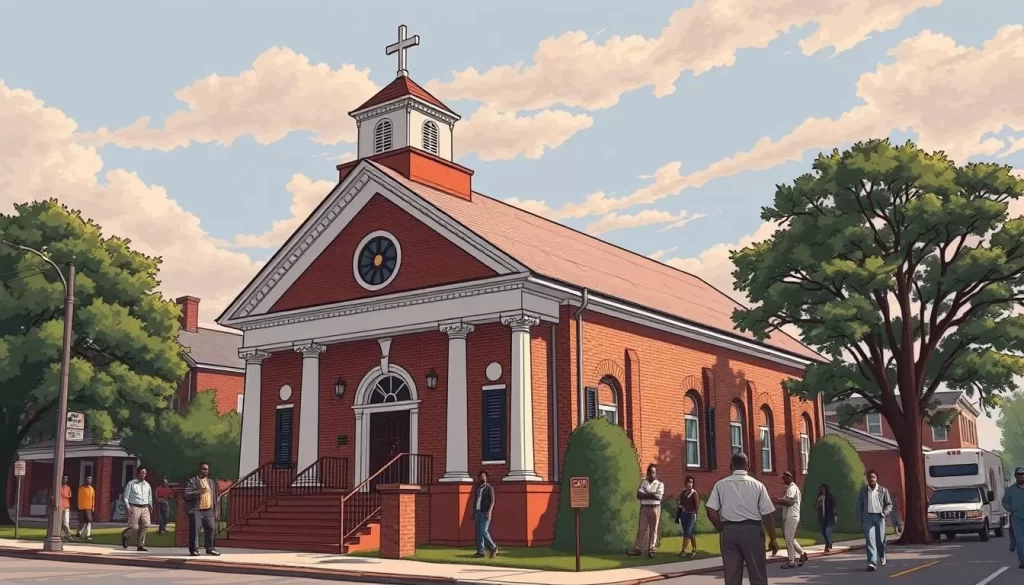
You can experience the rich history of the Civil Rights Movement at Brown Chapel AME Church. This historic church played a crucial role in the 1965 Selma to Montgomery marches, serving as a meeting place for civil rights leaders and activists.
Historical Role in the Civil Rights Movement
The Brown Chapel AME Church was more than just a spiritual center; it was a strategic planning location during the height of the voting rights campaign. Martin Luther King Jr. and other civil rights leaders, including local activists, gathered here to organize and strategize. The church’s role in the movement is a testament to the bravery and determination of those who fought for justice.
The church’s significance extends beyond its role in the marches. As an African Methodist Episcopal church dating back to 1908, it holds architectural and historical significance. Visitors can learn about its history and the stories of local congregation members who participated in the marches.
Visiting the Church Today
Today, Brown Chapel AME Church stands as a symbol of the Civil Rights Movement. Visitors can tour the church and learn about its significance. Tours are available by appointment, arranged through Joyce O’Neal at (334)875-3112 or (334)505-9779, or via email at brownchapel.selma@gmail.com. By visiting, you can understand the church’s continued role in the community and its importance as a site of commemoration.
Selma Interpretive Center: Your First Stop
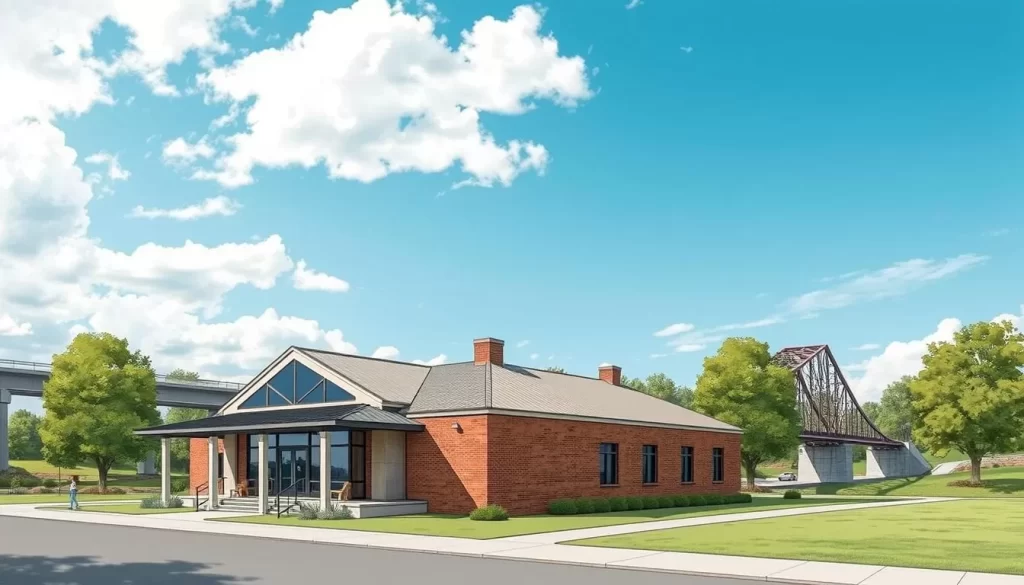
To fully appreciate Selma’s rich civil rights history, begin your journey at the Selma Interpretive Center, a key point for understanding the city’s significant role in the movement. The center is strategically located at the foot of the Edmund Pettus Bridge, making it an ideal location to start your tour of Selma’s historic sites.
Exhibits and Educational Resources
The Selma Interpretive Center offers comprehensive exhibits that provide context for the voting rights struggle and Selma’s place in American history. You’ll find educational resources, including films, photographs, and interactive displays that bring history to life. The center illustrates the obstacles faced by Black voters, including exhibits demonstrating the impossible “tests” given to potential voters.
Planning Your Visit from Here
After exploring the center, you’re well-equipped to plan the rest of your visit to Selma. The National Park Service rangers are available to assist in planning your tour and answering questions about Selma’s historical sites. With amenities like restrooms, water fountains, and a small bookstore and gift shop, the Selma Interpretive Center is the perfect starting point for your trip to Selma.
Old Cahawba Archaeological Park: Alabama’s Ghost Town
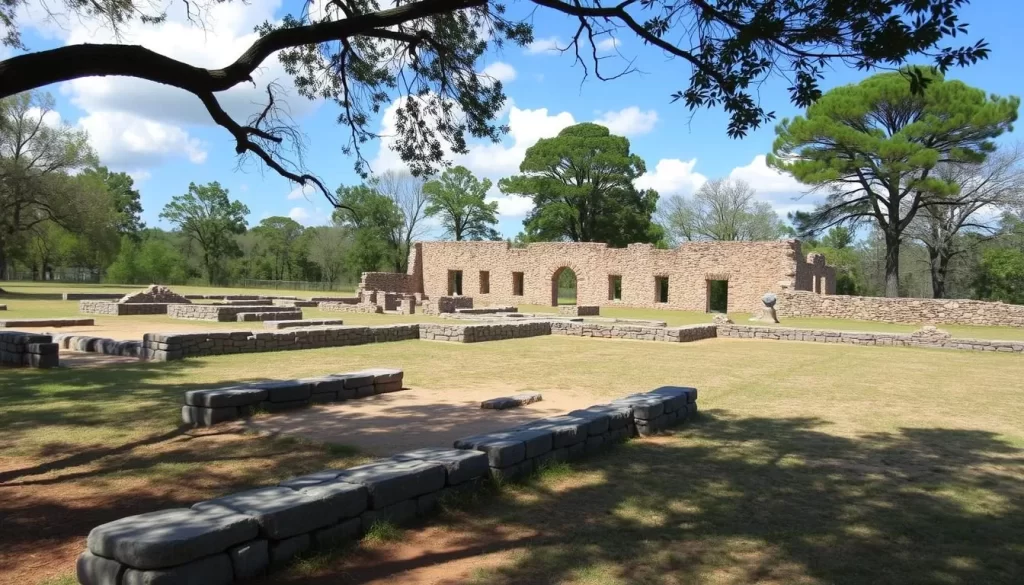
The Old Cahawba Archaeological Park, situated just outside Selma, is a must-visit for history enthusiasts. This fascinating site was once Alabama’s first state capital and is now a ghost town with well-preserved ruins and artifacts.
History of Alabama’s First Capital
Old Cahawba was a thriving river town in the early 19th century, serving as Alabama’s capital from 1820 to 1826. The town was abandoned after the Civil War due to flooding and the rise of other urban centers. Today, visitors can explore the remnants of the town’s buildings, cemeteries, and streets, gaining a glimpse into Alabama’s early history and the lives of its former residents.
Activities and Tours Available
Visitors to Old Cahawba Archaeological Park can enjoy a variety of activities, including hiking trails, bike tours, and canoeing opportunities. The park offers hiking trails that wind through the historic site, providing a unique perspective on the town’s layout and significance. You can also explore the confluence of the Cahaba and Alabama Rivers by canoe, observing local wildlife and taking in the natural beauty of the area. For a more leisurely experience, take a self-guided tour of the park’s historic sites and learn about the history of this significant state landmark.
As you travel through Old Cahawba, you’ll discover the stories of the diverse communities that once called this town home, from plantation owners to enslaved people and freedmen. The park’s riverfront location adds to its natural beauty, making it a perfect spot for a day trip or a longer visit.
Civil Rights Memorial Park and Other Historical Sites
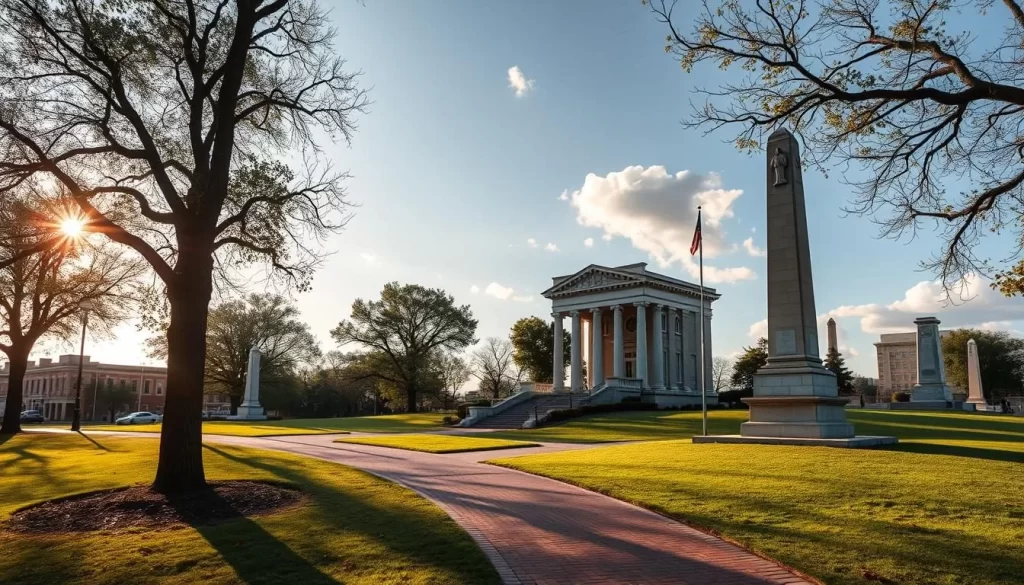
As you explore Selma, Alabama, you’ll discover a wealth of historical sites that played a crucial role in the Civil Rights Movement. One of the most significant sites is the Civil Rights Memorial Park, located just across the Edmund Pettus Bridge.
The Memorial Park Experience
The Civil Rights Memorial Park is a poignant tribute to the brave protesters who marched for voting rights. The park features monuments that remember the protesters and peaceful walking trails through Spanish moss-draped woods, offering a place for reflection on Selma’s civil rights history. As you stroll through the park, you’ll be surrounded by the serene atmosphere and the significance of the site.
Additional Historical Landmarks
Selma is also home to other historical landmarks that are worth visiting. The Dallas County Courthouse, where Sheriff Jim Clark ruled with an iron fist, was a flashpoint in the voting rights struggle. You can also explore Martin Luther King Jr. Street (formerly Sylvan Street), the heart of Selma’s Black community and center of civil rights organizing. Other notable sites include the First Baptist Church, which served as headquarters for the Student Nonviolent Coordinating Committee (SNCC), and the Old Depot Museum’s Civil Rights Room, which contains hospital logs documenting injuries sustained by marchers on Bloody Sunday.
Where to Eat in Selma: Southern Cuisine at Its Best
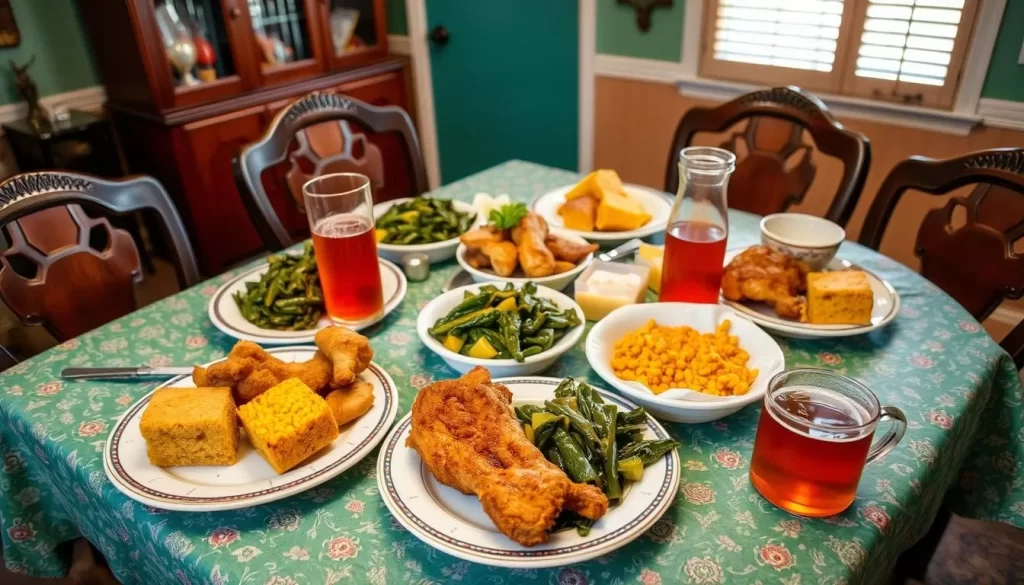
When visiting Selma, you’ll discover a culinary scene that is deeply rooted in the city’s history and culture. Selma’s restaurants offer a unique experience that combines traditional Southern flavors with the city’s rich heritage.
Local Favorites and Hidden Gems
The Coffee Shoppe, a once-segregated diner now Black-owned, is a must-visit location near the Edmund Pettus Bridge. It’s perfect for scones, sandwiches, and coffee. Another local favorite is The Downtowner, known for its biscuits and gravy and peach cobbler. For barbecue enthusiasts, Lannie’s Bar-B-Q Spot and Hancock’s Country Bar-B-Que are top choices, offering classic Southern favorites and legendary smoked barbecue.
Must-Try Southern Dishes
When in Selma, be sure to try the smoked pulled pork topped with cracklings at Lannie’s Bar-B-Q Spot. Hancock’s Country Bar-B-Que is worth a short trip from town for its hickory-and-pecan-smoked barbecue. At The Downtowner, enjoy authentic Southern breakfast and lunch, including their famous biscuits and gravy. These local eateries not only offer delicious food but also provide insight into Selma’s culture and history, making your travel experience even more enriching.
Accommodation Options: Where to Stay in Selma
Selma, a town rich in history, offers a range of places to stay, from charming historic inns to modern chain hotels. When planning your trip, it’s essential to book ahead, especially during special events or peak travel seasons.
Historic St. James Hotel
The St. James Hotel is a top choice, offering the best location in town with views overlooking the Alabama River. After a recent renovation, this historic inn has become even more appealing. If your budget allows, it’s a great choice for your stay.
Chain Hotels and Alternative Lodging
For those looking for more conventional options, Selma has several chain hotels along Highland Avenue (US80), including Hampton Inn Selma, Holiday Inn Express Hotel & Suites, Quality Inn Selma, and Comfort Inn. These hotels offer amenities like pools, free breakfast, and business centers. Alternatively, you can explore stylish AirBnbs in a century-old renovated downtown building, offering a unique experience.
Nearby Options in Montgomery and Birmingham
If accommodations in Selma are fully booked, consider staying in nearby cities like Montgomery (about an hour away) or Birmingham (about two hours away). These cities offer a wider range of hotels and are convenient for day trips to Selma.
Best Time to Visit and Practical Travel Tips
To make the most of your trip to Selma, it’s essential to understand the best times to visit and how to navigate this historic city. Selma is known for its significant role in the civil rights movement, and visiting at the right time can enhance your experience.
Seasonal Considerations and Annual Events
Selma hosts several significant events throughout the year, with the annual Bridge Crossing Jubilee in March being a highlight. This event commemorates the 1965 Selma to Montgomery marches and attracts many visitors, including presidential candidates and civil rights leaders. If you’re planning to visit during this time, it’s crucial to book your accommodations well in advance due to the limited availability of hotel rooms.
The event is a significant part of Selma’s calendar, and your visit during this period will be memorable. However, it also means that you need to plan ahead for your travel and accommodation.
| Event | Month | Significance |
|---|---|---|
| Bridge Crossing Jubilee | March | Commemorates the 1965 Selma to Montgomery marches |
Getting Around Selma
Selma is relatively compact, and many of its historical sites are within walking distance of each other. You can easily explore the city’s historic district on foot. However, to visit surrounding areas or travel to nearby cities, having a car is advisable.
Here are the approximate travel times from nearby cities:
| City | Travel Time |
|---|---|
| Birmingham | 2 hours |
| Montgomery | 1 hour |
| Atlanta | 3 hours |
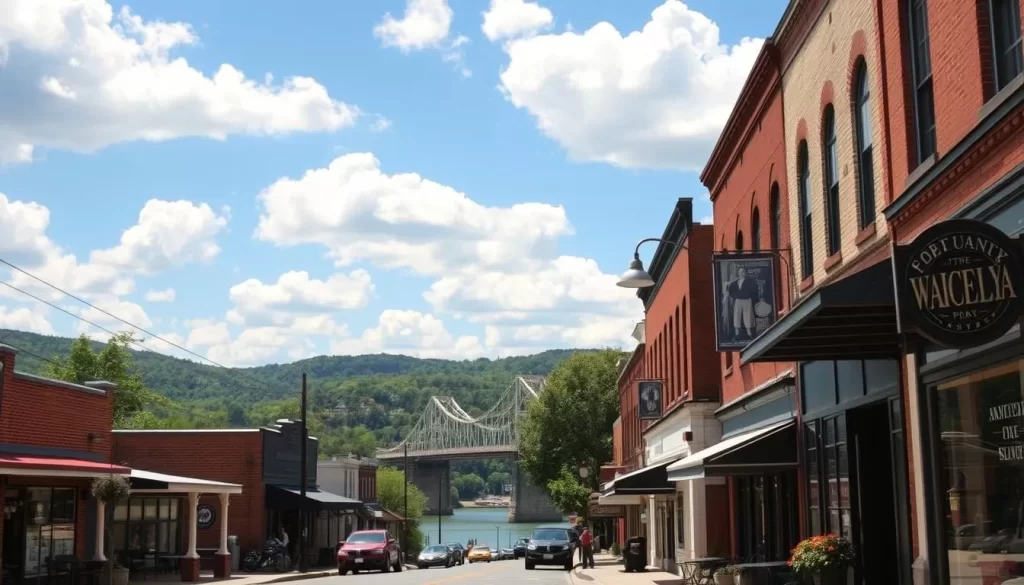
Conclusion: Experiencing Selma, Alabama: Best Things to Do – Top Picks
The experience of visiting Selma is transformative, leaving a lasting impact on those who walk in the footsteps of civil rights leaders. As you explore this historic city, you’ll discover that its significance extends far beyond the Edmund Pettus Bridge and other landmarks. Selma’s rich history, cultural heritage, and ongoing commitment to social justice make it a unique travel destination.
By supporting local businesses and engaging with the community, you’ll contribute to the preservation of this important historical site. The lessons of Selma remain relevant today, informing ongoing conversations about civil rights and democracy. As you leave Selma, you’ll carry with you a deeper understanding of America’s ongoing struggle for equality and a newfound appreciation for this city as a place of pilgrimage.
The above is subject to change.
Check back often to TRAVEL.COM for the latest travel tips and deals.
